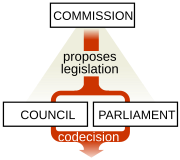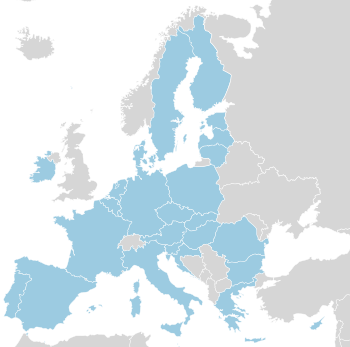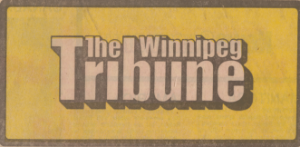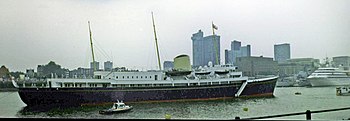 |
| The legislative triangle of the European Union (Photo credit: Wikipedia) |
 |
| Robert Schuman proposed the Coal and Steel Community in May 1950. (Photo credit: Wikipedia) |
 |
| European Union (Photo credit: Wikipedia) |
It
has been obvious for many years that the European Community has been designed
to be a citadel of capitalism. Given how capitalism has developed into frank
oligarchy in so many countries in the last twenty years, this has to be accounted
the major defect of the effort to unite Europe.
Almost no sensible person could object to
the European countries getting together in an effort to overcome the repeated
wars they have fought against and between each other up to the recent past. As
we all know these wars escalated in brutality, intensity and destruction, right
up to the dreadful Second World War, with its death toll of nearly 73 million
people. The greatest wars have all broken out in Europe, more than 5,000,000 of
whose civilians died, in the last great war, to which must be added the nearly
10 million Soviet civilians killed, out of that nation’s total deaths of an
estimated 25 million. These figures are staggering, and alone provide the
impetus for the effort made since the war to establish Europe as an area
devoted to peace between neighboring states.
Europe has proceeded towards unification
in a succession of small steps, leading up to the establishment of a European
Union with an elected Parliament, voted for by the citizens of the 28 member
states, and a common currency called the Eurozone to which 19 members subscribe
(plus another six tiny entitles which are not members of the Community), and
nine do not, including the United Kingdom, Sweden and Denmark.
A feature of the way these institutions
have developed is that a great deal of European affairs are now run by bodies
appointed by these representative bodies: that is, unelected people, officials,
bureaucrats whose job is to administer the strictly capitalist rules
established to guide the development of the European economy.
A major problem has been that some
countries, notably France and Germany, are economically and politically
powerful, while many of the other 26 are small countries with less developed
economies that, thrust into this vigorous environment, are finding it difficult
to keep up or adjust. Among these are
Spain, Portugal, Italy and Greece.
Greece has been, shall we say, the
basket-case among these poorer nations, sinking into a mountain of debt which,
left-wing detractors say, was contracted not to aid the living standards of the
Greek people, but to support banks and oligarchs with loans which were simply
removed from the country into the accounts of these banks and oligarchs --- in
other words, the wealthy segment of society.
Now,
it cannot be argued that the Greeks were not, at least to a certain extent,
responsible for their own plight. Former Greek governments, including the
so-called leftist Pasok government headed by Andreas Papandreau (who spent many
years exile in /Canada during the reign of the Greek army colonels, while
talking a good case for reform while in opposition, once elected dropped the ball,
as it were, and accepted holus-bolus the dictatorship of these wealthy foreign
lenders, with the tough conditions imposed on them to ensure that all whisper
of a left-wing solution --- such ass public investment, public ownership of
resources, welfare support to the poorest, and so on, were quashed in the bud.
In the most recent example of this
draconian economic dictatorship in favour of market capitalism, the Greek
people have been reduced to penury by the austerity policies imposed by the
European institutions, headed by Germany. Headed among their punishments have
been levels of unemployment impossible for any nation that hopes to maintain
its citizenry in good health.
The left-wing political party Syriza that
has taken office since the last election a few weeks ago was formed originally
through the merger of various small Marxist groups arguing for a root-and-branch
reform that would have, at its extreme, have seen Greece renege on these massive, unpayable
debts, with the probable result that the country would be forced by the
capitalist institutions governing Europe to leave the Eurozone, with unforeseeable
consequences for the European economies.
The new government got busy as soon as it
was elected, its new finance minister, Yanis Varoufakis, who had been peacefully
teaching economics in Texas until a month or so before the election, making the
rounds of European leaders to argue their case for concessions It has to be
reported that these talks brought no sense of the entrenched powers being ready
to help the new government reform the institutions reform themselves. They were given a weekend
in which to produce a plan for reform, which if not accepted by all 26 member
states, would never be implemented.
Sure enough, they have produced a
document of some kind about which contending parties have produced very
different interpretations. The new once-fire-eating Syriza government has
suggested an extension of the present arrangements, which at least would give
them four months to work out a viable and workable programme, but in doing so
the government has undertaken “to refrain from any rollback of measures and
unilateral changes to the policies and structural reforms,” while it has been
charged with preparing “reform measures, based on the current arrangement” ---
an arrangement that Tsipras, the Greek leader, had, in his election, promised
to repudiate.
It did not take long for old-line
socialists, veterans of the decades-long struggle for economic justice in
Greece to denounce these agreements as a betrayal. Tyical was Manolis Glezos,
an old fighter for socialist justice, who said: “Some
argue that to reach an agreement, you have to retreat. First: there can be no compromise
between oppressor and oppressed. Between the slave and the occupier is the only
solution is Freedom. But even if we accept this absurdity, the
concessions already made by the previous pro-austerity governments in terms of
unemployment, austerity, poverty, suicides have gone beyond the limits.” He
added that Syriza members, friends and supporters at all levels of
organizations should decide in extraordinary meetings whether they accept this
situation.
An even more
brutal verdict was announced on the web site of
the International
Committee of the Fourth International (ICFI). They wrote:
“Even in the entire squalid history of ‘left’ petty-bourgeois
politics, it is difficult to find an example of deceit, cynicism and truly
disgusting cowardice that quite matches that of Prime Minister Tsipras.
Certainly, from the standpoint of the time that elapsed between election and
betrayal, the Syriza government has probably set a new world record. In the
hours following an agreement that is nothing less than a complete capitulation
to the European Union, Tsipras let loose another barrage of demagogic lies in a
pathetic attempt to deny the magnitude of Syriza’s prostration and to cover up
his own political bankruptcy.
“ ‘We kept Greece standing and dignified,’
declared Tsipras, in a televised statement that seemed oblivious to reality. He
claimed that the agreement with Eurogroup finance ministers ‘cancels
austerity.’ Tsipras added: ‘In a few days we have achieved a lot, but we have a
long road. We have taken a decisive step to change course within the euro
zone.’ ”
James Petras, formerly director of
the Centre for Mediterranean Studies in Athens, struck a more apocalyptic tone
in an article under the title The
Assassinaton of Greece, distributed online by the Voltaire Network:
“The Greek
government is currently locked in a life and death struggle with the elite
which dominate the banks and political decision-making centers of the European
Union. What are at stake are the livelihoods of 11 million Greek workers,
employees and small business people and the viability of the European Union. If
the ruling Syriza government capitulates to the demands of the EU bankers and
agrees to continue the austerity programs, Greece will be condemned to decades
of regression, destitution and colonial rule. If Greece decides to resist, and
is forced to exit the EU, it will need to repudiate its 270 billion Euro
foreign debts, sending the international financial markets crashing and causing
the EU to collapse.
“The leadership of the EU is
counting on Syriza leaders abandoning their commitments to the Greek
electorate, which as of early February 2015, is overwhelmingly (over 70%) in
favor of ending austerity and debt payments and moving forward toward state
investment in national economic and social development. The choices are stark;
the consequences have world-historical significance. The issues go far beyond
local or even regional, time-bound, impacts. The entire global financial system
will be affected.”
So, these are the choices as we wait to see how it all comes
out. At time of writing, the money would
seem to be on the EU bullying their way into keeping the European Union
capitalist, and no mistake.





